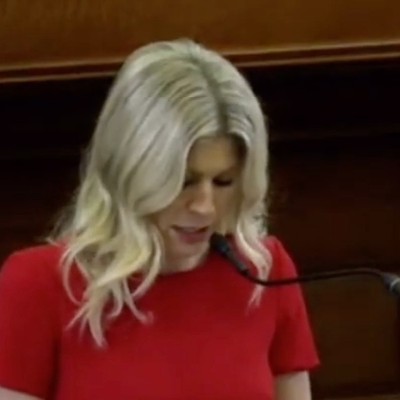'Apollo had its huge supporters and huge detractors. We just didn't seem to have anything in between," Grier says. "If you supported it, it was almost like you blindly supported it. If you opposed it, you were so passionate about opposing it that you wouldn't believe the evidence if the evidence was there."
Count as one of Grier's supporters the Council of Great City Schools, which a few weeks ago named him Urban Educator of the Year. A list of accomplishments included his work as leader of the Apollo 20 initiative, which according to an HISD press release generated remarkable results. Besides raising an extraordinary amount of money, Grier and HISD were applauded for creating a program that "helped [Apollo 20] students in these schools achieve academic gains on-par with the nation's top-performing charter schools."
It took weeks of repeated requests to find out from HISD which "top-performing charter schools" were used for comparison. Turns out they were charters from New York City where Fryer and his EdLabs could get the statistics, Grier said in a sit-down meeting with the Houston Press.
KIPP and Yes Prep here in Houston wouldn't give them the numbers, Grier explained. A follow-up inquiry to HISD about what national tests were used to compare Houston's Apollo 20 schools to New York charter schools yielded the following answer: "The analysis is using state test scores from the respective programs to analyze the change based on standard deviation and effect size. So rather than compare actual test scores to test scores, it compares the standard deviation and effect size of the change in the test scores for Apollo schools with the standard deviation and effect size of the change in the test scores for NYC charters."
Even someone who's not a psychometrician might have trouble with all the wiggle room there is in this equation.
Grier points repeatedly — and with justification — to the increase in math scores. Whether the progress was sustainable was another matter. An independent review of the Apollo 20 project by Rice University's Houston Education Research Consortium acknowledged the improved scores but noted that the first year's gains were much larger than the second's. Fryer opposed a third-party review, but Board President Juliet Stipeche insisted on it, saying it was ridiculous that Apollo's creator would be its sole evaluator.
Grier agrees math scores dipped after Apollo 20 ended, but points out there were drops in math scores around the district.
Throughout the Apollo 20 experiment, Grier and others stressed that the goal was to get all its students coming out of eighth grade to be on grade level, especially in reading and math, and to get them college ready.
That's something that Stipeche has discussed repeatedly, but there's no doubt she sees it differently from the way Grier does. She thinks there's too much emphasis on high-stakes testing and not enough on learning in HISD. She sees students being used as money generators for vendors offering books and programs that end up costing thousands and millions of dollars with little return on investment. She also voted against rehiring EdLabs for the next big HISD project.
The standards of any school district should be reasonable, reliable and effective, she says, and our current testing system is not reasonable ("too many tests") or reliable ("kids are graduating, but they are not set to succeed") or effective ("it's not effective; the whole system has undermined the intention to learn," she says).
Jefferson Sanchez, a Texas A&M sophomore and political science major, is the product of two Apollo schools and had a varying experience and mixed feelings about how effective the program was. At Lee High School, he says, he felt he was "treated as another student who was doing bad things all the time," but at the same time he keeps in touch with some teachers there.
He transferred to Sharpstown for his junior and senior years. There were the same longer hours — he wasn't a fan — but there were other things he did appreciate. "There was more order in the hallways. The Sharpstown principal shook his hand on the first day — something that never happened at Lee. He got involved in school, got his grades up and formed an ecology club on campus that distributed recycling bins around the school.
Sanchez says he never had a problem with TAKS (the Texas Assessment of Knowledge and Skills, the immediate precursor to STAAR), but thinks there was too much emphasis on testing. He got a lot of help in English his junior and sophomore years, although after one teacher left halfway through the year, "I didn't learn anything after that."
And then he hit A&M and it was tough. He sat in an English class and was one of only a very few students who hadn't read a book that all the other kids had read in high school English. "I don't think we ever read that much in high school." He is still working hard to keep up, he says.
"The last two years of my high school were the best," he says. But when weighing the benefits of Apollo and its cost, he says, "In my experience, it is not worth it."
Terry Grier, a superintendent who has never been afraid to think big, insists that Apollo 20 was a far better alternative than letting the state come in and take over the district's low-performing schools. Apollo did much better by its students than methods employed in cities such as New Orleans, Denver, Detroit, Chicago and Philadelphia, he said.
Near the end of that August 14 board meeting, an obviously weary Grier told board members arguing over the EdLabs contract that Apollo did benefit the district. "We got good results. I still say we did, still believe we did."
In a separate meeting with the Press, Grier followed this up, saying that one of the biggest mistakes the district made with Apollo was that it didn't define from the beginning what success would be. "The original success for me early on was not for these schools to become Bellaire [High]. The success was trying to get them off this [state watch] list. The success was trying to get out-of-school suspensions down. The success to me was trying to have safe schools."
The schools they were working with (Jones, Sharpstown, Kashmere and Lee highs; Ryan, Attucks, Dowling, Fondren and Key middle schools; and Highland, Kelso, Robinson, Scarborough, Tinsley, Walnut Bend, Young, Blackshear, Davila, Frost and Isaacs elementary schools) were in most cases bleeding students. In a district of choice, the top students at many of these schools were going elsewhere, leaving behind a higher percentage of special-needs students, which made the turnaround even more difficult, Grier said.
"In our failing schools there's truly a third of our kids who opted to jump ship," Grier said. "We recruited like crazy to try to find those turn-around principals and within two years, we'd replaced about 40 to 45 percent of them, which I think tells you how hard those jobs are," Grier said.
Other lessons Grier says HISD learned: • Tutors made a "non-academic" difference and helped with the significant drop in disciplinary cases at the Apollo schools. • The district should adopt the charter model of adding one grade at a time, not trying to take over and change an entire school all at once. • Teachers should be evaluated using data-driven instruction; in fact, even more measurements should be used in assessing teachers (the next EdLabs-aided program).
Asked if he would have done anything different with Apollo 20, Grier says, "If I had to do it all over again, I'd replace every teacher, every adult in the building." It wasn't that the teachers they kept weren't good, he says, but to effect a change in culture at one school, teachers needed to be moved to another. And that's what HISD did when it took over the North Forest district, he said.
Grier points with pride to successes with Apollo. Two thirds of Apollo secondary schools came off the "Academically Unacceptable" list. College scholarship offers to students at Apollo High Schools skyrocketed from $3.74 million before Apollo 20 to $9.03 million in 2013. The number of students who applied to college from Apollo schools went from 62.3 percent in 2011 to 91.3 percent in 2013. There was an increase in the number of kids who score above 500 on their SATs.
He said too that if he had to go back to the city's leaders to ask for more money for a new program, he would have good chances of getting it. Apollo's mixed results did not spoil any future chances, he said.
Credit Grier for coming to Houston and disrupting the status quo, the assumption that because some schools were sad and sorry, they and the students stuck in them deserved nothing better.
There's no doubt Grier is aware that however Apollo 20 is finally judged will affect how he goes down in superintendent history. Showing off his good numbers is understandable. Implementing approaches from lessons learned is nothing but good.
But efforts by Grier and some board members to rewrite history, saying Apollo was math only, are not. Retooling the program's stated objectives four years later to match what was achieved in a way only diminishes the value of any real gains that were made by a lot of hardworking HISD employees — including Terry Grier.






